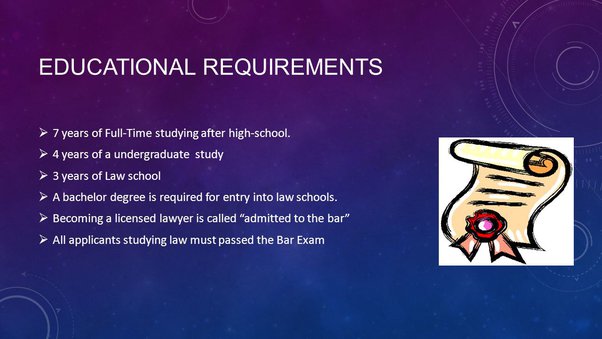So, you’re considering a career as a lawyer. You’ve seen them on television, passionately arguing cases in the courtroom, and you’ve been intrigued by the complexities of the legal system.
But have you ever wondered about the education requirements for becoming a lawyer? Well, let’s start with the basics. To embark on this profession, you’ll need to earn a Bachelor’s Degree, but that’s just the beginning.
There’s much more to uncover when it comes to the path of becoming a lawyer, and it’s not as straightforward as you might think.
Bachelor’s Degree
To become a lawyer, you’ll need to earn a Bachelor’s degree. This is the first step on your path to a legal career. A Bachelor’s degree is a four-year undergraduate program that provides a solid foundation in various fields of study.
While there’s no specific major required for law school admission, it’s advisable to choose a field that will develop your critical thinking, research, writing, and communication skills.
During your Bachelor’s degree, you’ll take a variety of courses that will hone your analytical abilities and expand your knowledge base. Subjects such as history, political science, philosophy, and English can help you develop the skills necessary for success in law school. Additionally, it’s important to maintain a high GPA as law schools place a strong emphasis on academic performance during the admissions process.
In addition to your coursework, you should also consider participating in extracurricular activities that will enhance your skills and demonstrate your commitment to the legal profession. Joining debate or mock trial teams, volunteering at legal clinics, or interning at law firms can provide valuable experiences and help you stand out among other applicants.
LSAT Preparation
Now that you have completed your Bachelor’s degree and developed foundational skills, it’s time to prepare for the LSAT, the next crucial step on your journey to becoming a lawyer.
The Law School Admission Test (LSAT) is a standardized exam that assesses your critical thinking, analytical reasoning, and reading comprehension skills. It’s an essential component of the law school application process, as it helps admissions committees evaluate your potential to succeed in law school.
Preparing for the LSAT requires dedication and strategic planning. Familiarize yourself with the format and content of the exam by accessing practice tests, study guides, and online resources. Consider enrolling in an LSAT preparation course or working with a tutor to enhance your understanding of the test and improve your performance.
Develop a study schedule that allows you to allocate sufficient time for practice and review. Break down the content into manageable sections and focus on mastering one concept at a time. Create a conducive study environment that minimizes distractions and maximizes your concentration.
Prioritize consistent practice to build your confidence and improve your test-taking skills. Take timed practice tests to simulate the real testing conditions and assess your progress. Analyze your performance to identify areas for improvement and adjust your study plan accordingly.
Law School Application Process
Once you have successfully prepared for the LSAT, it’s time to navigate the law school application process. This process can seem overwhelming, but with the right approach, you can increase your chances of getting accepted into the law school of your choice.
The first step is to research and identify the law schools that align with your interests and goals. Consider factors such as location, reputation, specialty programs, and cost.
Once you have narrowed down your options, carefully review each school’s application requirements and deadlines. Common components of a law school application include your undergraduate transcripts, LSAT scores, personal statement, letters of recommendation, and a resume. It’s crucial to pay attention to each school’s specific instructions and submit all required documents accurately and on time.
Your personal statement is an opportunity to showcase your unique qualities, experiences, and motivations for pursuing a legal career. Make sure to proofread your application thoroughly and seek feedback from trusted mentors or advisors.
Juris Doctor (J.D.) Degree
To obtain a Juris Doctor (J.D.) degree, you must fulfill specific degree requirements and complete specialized legal training. These requirements typically include completing a certain number of credit hours, passing certain examinations, and participating in practical experiences such as internships or clinical programs.
The J.D. degree provides you with the necessary foundation and knowledge to begin your career as a lawyer.
Degree Requirements
Completing a Juris Doctor (J.D.) degree is a necessary step for individuals pursuing a career in law. To earn this degree, you must first have a bachelor’s degree from an accredited institution. While there’s no specific undergraduate major required, it’s beneficial to study subjects that develop critical thinking, analytical, and writing skills.
Once you have your bachelor’s degree, you can apply to law school. Law schools typically require applicants to submit their undergraduate transcripts, LSAT scores, letters of recommendation, and a personal statement.
The J.D. program generally takes three years to complete, and it includes courses such as constitutional law, contracts, criminal law, and legal writing. During your time in law school, you may also have the opportunity to participate in internships or externships to gain practical experience in the legal field.
Specialized Legal Training
Obtaining a Juris Doctor (J.D.) degree is a crucial step towards specialized legal training for aspiring lawyers. This degree is a professional graduate program that prepares individuals for a career in law.
The J.D. program typically takes three years to complete and covers a wide range of legal subjects, including contracts, criminal law, constitutional law, and civil procedure. During the program, students acquire essential skills such as legal research, writing, and critical thinking.
They also have the opportunity to participate in clinical programs and internships, gaining practical experience in real-world legal settings. Upon graduation, students are eligible to take the bar exam, which is required to practice law.
The J.D. degree provides aspiring lawyers with the necessary foundation for their legal career and paves the way for further specialization and advancement in the field.
Bar Exam Preparation
When preparing for the bar exam, it’s important to gather the necessary study materials and resources. Exam study materials such as practice exams, outlines, and review books can help you familiarize yourself with the format and content of the exam.
Additionally, effective time management strategies, such as creating a study schedule and setting specific goals, can help you stay organized and make the most of your study time.
Exam Study Materials
To effectively prepare for the Bar Exam, ensure you have access to comprehensive study materials. These materials are essential for covering all the necessary topics and concepts that will be tested on the exam. Look for study guides, textbooks, practice exams, and online resources that are specifically designed to help you succeed in the Bar Exam.
It’s important to choose materials that align with the format and content of the exam you’ll be taking, as requirements can vary by jurisdiction. Consider using study materials from reputable publishers or organizations that have a track record of success in preparing students for the Bar Exam.
Remember to allocate enough time to thoroughly review the study materials and practice with sample questions to build your confidence and test-taking skills.
Time Management Strategies
Now that you have access to comprehensive study materials for the Bar Exam, it’s crucial to implement effective time management strategies to maximize your preparation and chances of success.
The Bar Exam is a demanding test that requires thorough and focused study. To effectively manage your time, start by creating a study schedule that includes dedicated time for each subject and topic.
Prioritize your study sessions based on the weightage of each subject in the exam. Break down your study sessions into smaller, manageable chunks to maintain focus and prevent burnout.
Utilize study aids and resources that help you review and understand the material efficiently. Additionally, set specific goals for each study session and track your progress to stay motivated.
Bar Exam
Passing the Bar Exam is a crucial step in becoming a licensed lawyer. This exam is designed to test your knowledge and understanding of the law. It’s a comprehensive assessment that evaluates your ability to apply legal principles in practical scenarios.
The Bar Exam is typically split into two parts: the Multistate Bar Examination (MBE) and the state-specific portion. The MBE consists of multiple-choice questions that cover various areas of law, including constitutional law, criminal law, contracts, and torts. The state-specific portion focuses on the laws of the particular jurisdiction where you plan to practice law.
Preparing for the Bar Exam requires dedication and discipline. You’ll need to study extensively to ensure that you have a solid understanding of the legal concepts and principles that will be tested. Many aspiring lawyers enroll in bar review courses to help them review and reinforce their knowledge. These courses often include practice exams and study materials that can be invaluable in your preparation.
On the day of the exam, it’s important to stay calm and focused. Remember to read each question carefully and analyze the options before selecting your answer. Time management is crucial, as you’ll have a limited amount of time to complete each section of the exam. It’s essential to pace yourself and not get stuck on difficult questions.
Passing the Bar Exam is a significant achievement that opens the doors to a rewarding legal career. It demonstrates your competence and ability to practice law effectively. So, study hard, stay focused, and trust in your abilities. You have what it takes to pass the Bar Exam and become a licensed lawyer.
Continuing Legal Education (CLE)
Continuing Legal Education (CLE) is a requirement for licensed lawyers to stay updated and enhance their knowledge and skills in the legal field. As a lawyer, it’s crucial to continuously learn and adapt to the ever-changing legal landscape. CLE programs provide opportunities for you to stay current with new laws, regulations, and legal precedents. These programs also aim to improve your legal skills, such as research, writing, negotiation, and advocacy.
Most jurisdictions have mandatory CLE requirements that lawyers must fulfill to maintain their licenses. These requirements vary by jurisdiction, but typically involve completing a certain number of CLE hours within a specified period. In addition, some states may have specific subject matter requirements, such as ethics or professionalism, that must be met.
CLE programs offer a wide range of formats to accommodate different learning styles and schedules. You can choose from in-person seminars, webinars, online courses, and self-study options. Many organizations, including bar associations, law schools, and professional legal education providers, offer CLE programs.
Continuing Legal Education not only ensures that you stay up-to-date with the latest legal developments, but also provides an opportunity for networking and professional growth. By actively participating in CLE activities, you demonstrate your commitment to maintaining high professional standards and continuing your legal education throughout your career.
Specialized Legal Certifications
To further expand your legal expertise and enhance your professional credentials, specialized legal certifications offer a valuable opportunity for advancement. These certifications allow you to specialize in a specific area of law, demonstrating your in-depth knowledge and commitment to a particular field. By obtaining a specialized legal certification, you can set yourself apart from other lawyers and increase your marketability to potential clients and employers.
Specialized legal certifications are typically offered by professional organizations and bar associations. They require additional coursework, exams, and sometimes practical experience in the specific area of law.
For example, if you’re interested in becoming a specialist in family law, you can pursue a certification offered by the American Academy of Matrimonial Lawyers. This certification demonstrates your expertise in divorce, child custody, and other related matters.
Obtaining a specialized legal certification not only enhances your professional reputation but also provides you with valuable skills and knowledge that can benefit your clients. It allows you to stay up to date with the latest developments and best practices in your chosen area of law. Additionally, specialized certifications often come with networking opportunities, allowing you to connect with other professionals in your field and expand your professional network.
Frequently Asked Questions
How Long Does It Typically Take to Complete a Bachelor’s Degree?
Typically, it takes about four years to complete a bachelor’s degree. This can vary depending on factors such as the program you choose and whether you attend full-time or part-time.
What Is the Average Cost of Law School Tuition?
The average cost of law school tuition can vary depending on the institution you choose. It’s important to research and compare different schools to find one that fits your budget and offers the education you need.
Are There Any Alternative Paths to Becoming a Lawyer Without a Juris Doctor (J.D.) Degree?
If you’re wondering about alternative paths to becoming a lawyer without a J.D. degree, there are some options like apprenticeship programs or earning a law degree from a foreign country.
How Often Are Bar Exams Offered and When Can I Take One?
Bar exams are typically offered multiple times a year, depending on your jurisdiction. You can take one after completing your law degree and meeting any other requirements set by your state’s bar association.
What Is the Passing Rate for the Bar Exam and What Happens if I Fail?
If you fail the bar exam, you may retake it. The passing rate varies by jurisdiction. Some states have a high pass rate, while others are more challenging. Don’t worry, with enough preparation, you can pass.
Conclusion
So, if you want to become a lawyer, here’s what you need to do.
First, get your bachelor’s degree and prepare for the LSAT.
Then, apply to law school and earn your Juris Doctor (J.D.) degree.
After that, you’ll need to study and prepare for the bar exam. Once you pass the exam, you can start practicing law.
Remember, though, that the learning doesn’t stop there. You’ll also need to engage in continuing legal education and consider specialized certifications to enhance your skills and knowledge in specific areas of law.
Good luck on your journey to becoming a lawyer!


